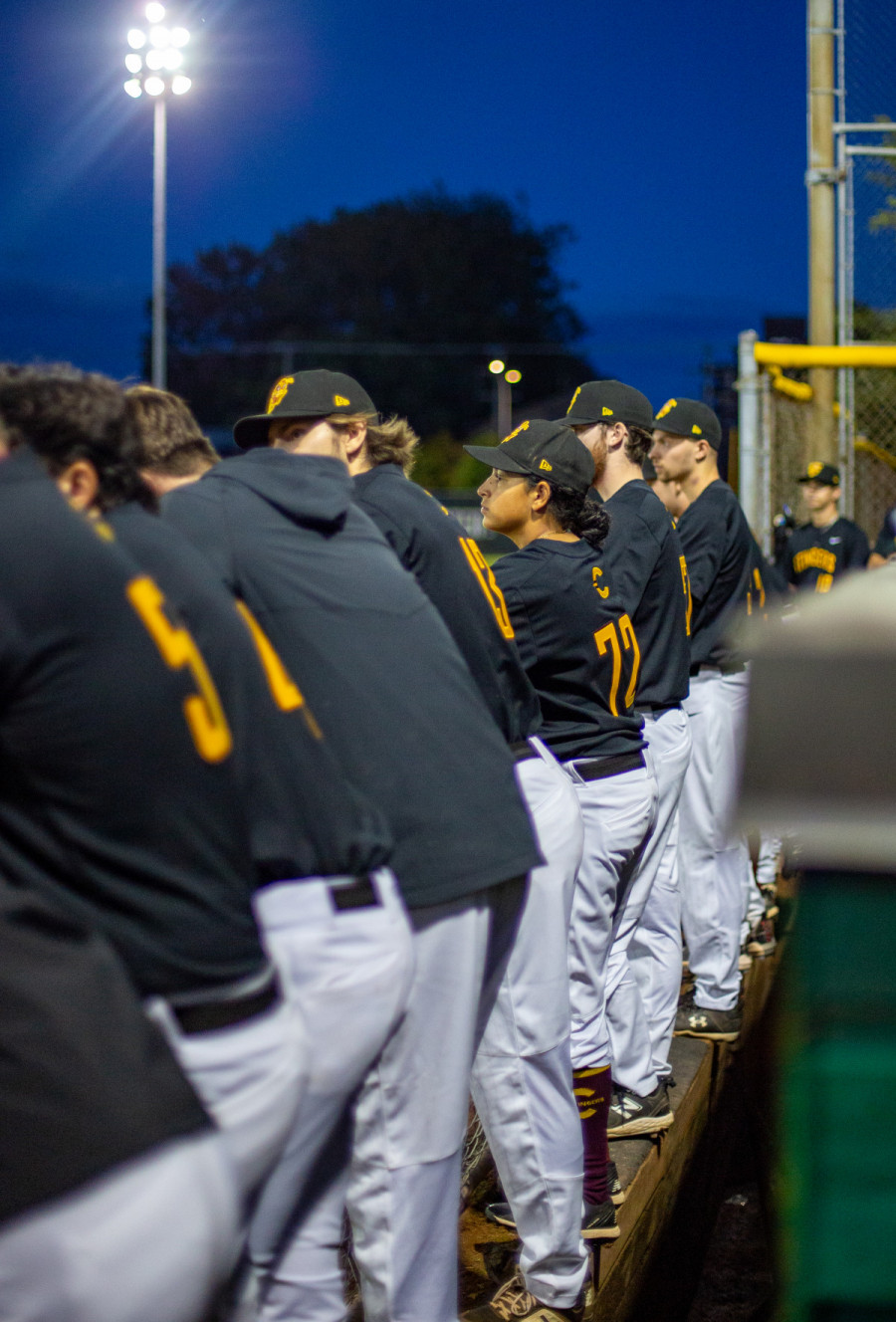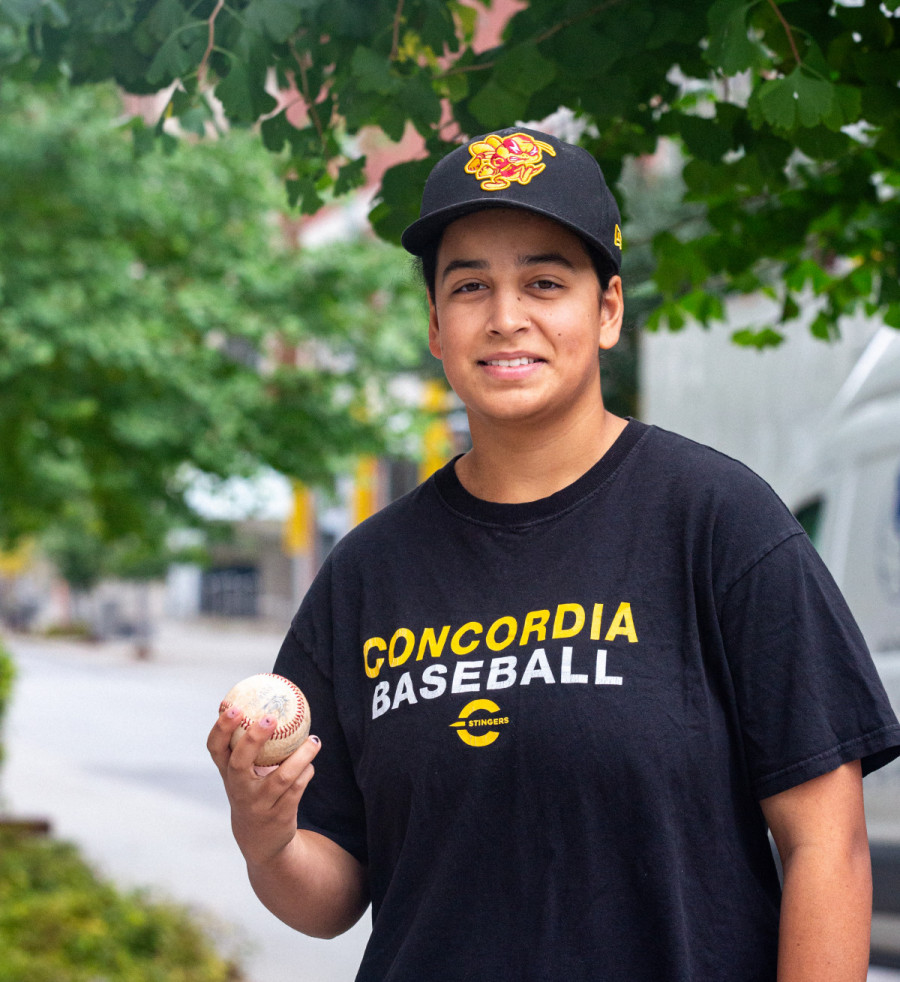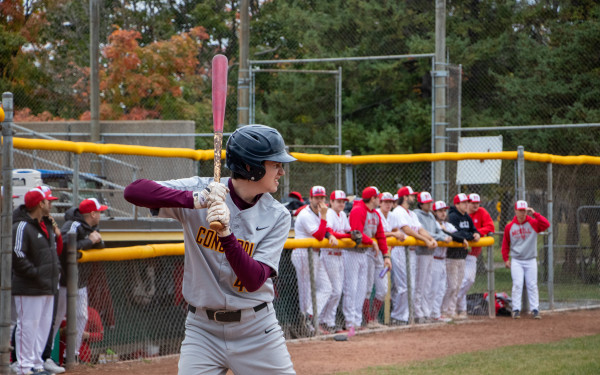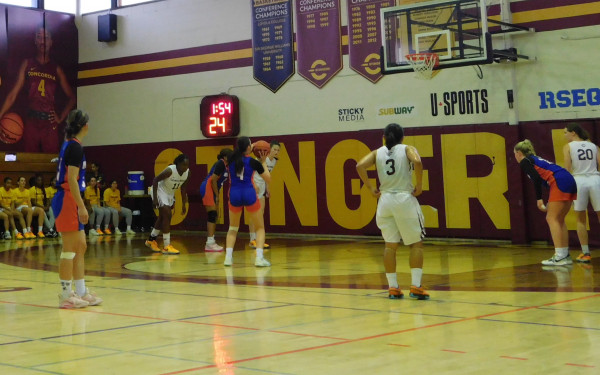Vanessa McKinley: Fueled by competition and adversity
The Stingers pitcher’s pursuit for success in a historically male-dominated sport
Vanessa McKinley had always craved to compete at the collegiate level.
She figured an appropriate avenue would be to play college softball, thinking that her true love of baseball wasn’t a possibility for women. However, she is now making that dream happen as a relief pitcher for the Concordia Stingers baseball team.
McKinley started playing softball when she was ten years old. After her last year of softball in grade eight, she ultimately decided to make the switch to baseball, where she took up the position she now holds with the Stingers.
“I was like, ‘Okay, well, no girls are playing baseball, so I guess I should get good at softball,’’ McKinley said. “Then, I started to see girls were making it happen (playing baseball), and I was going to be one of those girls.”
Coming from Burnaby, B.C., she had sent emails to every university with a baseball program, but found herself choosing Concordia’s team—led by head coach Howie Schwartz—because they seemed the most serious about her. “Howie offered me a spot without trying out, which was a big deal,” she said.
“The year that she wanted to come to Montreal, she heard about the fact that we were very open to having women participate in the sport,” Schwartz said.
While women are underrepresented in varsity baseball, McKinley is the second woman, after Bridget Kelly, to play for the Stingers. Kelly played second base and outfield for the Concordia baseball team before graduating.
“I feel like they really understood how to handle a girl on their team, because they already had Bridget on the team,” she said. “I knew it wasn't for publicity or anything, they wanted me to come play there.”
Schwartz, who has a tradition of connecting potential recruits with established players to get a better sense of the program, did exactly that with Kelly and McKinley. McKinley said that connection and reassurance helped her adjust quickly and effectively in the program.
“[Kelly] was always someone that I knew I could always talk to, before I even got there. Because you never really know how the guys are gonna be,” McKinley said. “They (the men) were awesome, but knowing that she was going to be there when I arrived, it really helped me. I think she was excited to have another girl on the team too.”
She admitted to being “horrible” when she began playing baseball, yet her unwavering passion for the game is what motivated her to persist.
“Everyone looks forward to something that they love. Everyone has one thing that makes life better, and for me, it was baseball,” McKinley said. “I got a lot better because I just loved practicing.”
For McKinley, being a woman in the sport has not always been a walk in the ballpark. She recalled getting odd looks from parents who weren’t used to seeing a woman on a baseball team. The situation is seemingly improving, she added, as more women are taking up baseball.
However, McKinley still notices additional pressure.
“Being the only woman at any of the games this year—because there's no Bridget and there are no other girls on any of these teams—I feel like there's more eyes on you,” she said. “Some of them are hoping that you don't succeed, but a lot of them are hoping that you do succeed. Feeling [that] support is really nice.”
McKinley can attest to the challenges other women face, having played on the all-girls baseball provincial squad, Team B.C.
“Every girl who's played baseball usually has a story about one coach or one parent who wasn't okay with them being there,” McKinley said.
I’m very happy to look down into the dugout and see her there. I like her as a person and I love having her on the team [...] I’m happy because of what she can do, how much she loves the game and how much you can contribute to the team. — Howie Schwartz
In recent years, women's representation has increased in baseball. Notably, Alyssa Nakken has been recently hired by the San Francisco Giants and is the first female full-time coach in MLB history. Before parting ways with the Miami Marlins, Kim Ng was the first female general manager. At the varsity level, Olivia Pichardo was the first woman to play Division I baseball for Brown University.
“[Women] have to work so much harder than the men, of course. Their every move is under scrutiny, everyone's watching them. There are such high expectations because they're the first women to do this,” McKinley said. “I feel like there's a lot of trailblazers right now and when there are more women who worked so hard to shove their way into those positions, it makes it easier for all women.”
McKinley is one of these trailblazers herself.
This summer, McKinley coached an all-girls U14 baseball team. She said that for these players, having female coaches is a different experience.
“[The girls I coach] see these women within coaching positions and it's making them more ambitious. They realize that they can do it too,” McKinley said.

Schwartz praised McKinley’s competitive fire, but also her accurate arm, a tool that was championed by Stingers catcher Thomas Savard as well.
“As a pitcher, [when] she's called on the mound, she's able to throw strikes. I know that if I'm putting my glove in a spot, she will hit it,” Savard said.
This season, McKinley appeared in five games, pitched a little over eight innings and recorded five earned runs against. “She had exceptional control and threw mostly strikes,” Schwartz said.
She finished the season with an ERA of 5.42, which was inflated due to one bad outing against the McGill Redbirds. Without it, Schwartz calculated that it would have been under four.
McKinley said she was happy with the progress she had made since her first season, notably getting her first win with the Stingers. “I got the game ball, so that was a really big moment for me. I think I'll remember that for the rest of my life honestly,” she chuckled, recalling the memory fondly .
Schwartz emphasized McKinley’s importance on the Stingers’ team.
“I'm very happy to look down into the dugout and see her there. I like her as a person and I love having her on the team,” Schwartz said. “The fact that she's a woman is certainly something I'm very much aware of and sensitive to, but that's not why I'm happy. I'm happy because of what she can do, how much she loves the game and how much you can contribute to the team.”
This article originally appeared in Volume 44, Issue 5, published October 31, 2023.







